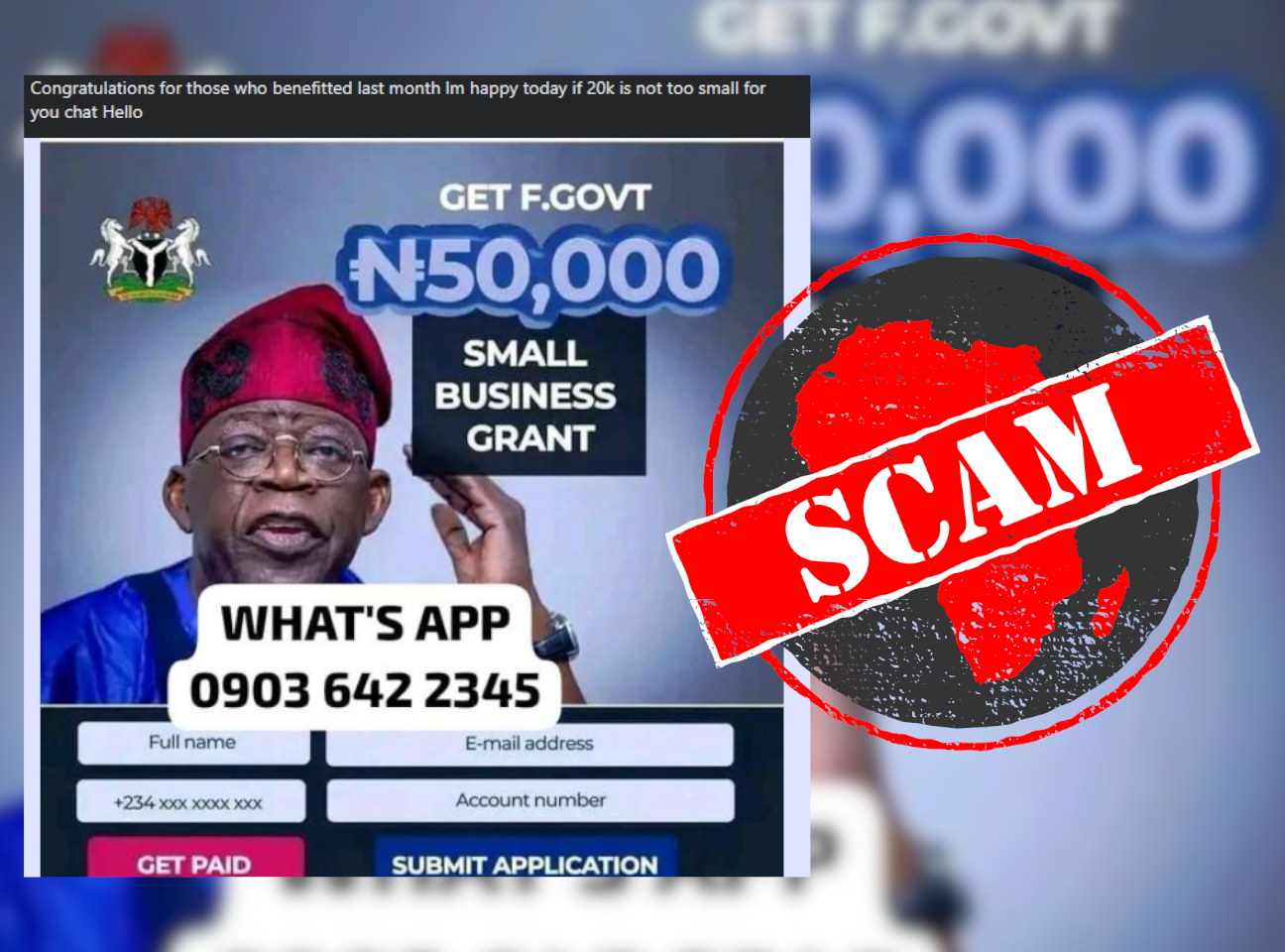IN SHORT: Several Facebook posts are using a Nigerian government initiative to try to defraud unsuspecting small businesses. The only way to apply for the grant is via the dedicated website, not WhatsApp as claimed on social media.
Facebook posts are calling on small businesses in Nigeria to apply for a N50,000 (about US$56) grant from the federal government.
One post, dated 9 January 2024, reads: “Congratulations for those who benefitted last month lm happy today if 20k is not too small for you chat Hello.”
While the post has a graphic promising N50,000 per beneficiary, the caption only mentions N20,000. It also has a WhatsApp number where interested users can supposedly apply.
A N50,000 grant was launched by the Nigerian government to support one million “nano” businesses across the country’s 774 local government areas. A nano business is one run by a small team of four people or less.
Similar posts can be found in public groups with thousands of members here, here, here, here, here, here, here, here, here, here, here, here, here and here.
But can interested businesses apply for this government grant via WhatsApp? We looked into it.

How to apply for federal government grant
The removal of the oil subsidy in mid-2023 led to an increase in food and fuel prices in Nigeria. The Presidential Conditional Grant Scheme (PCGS) aims to help the country’s small businesses stay afloat amid tough economic times.
To qualify for the grant, small businesses must meet certain criteria. The only way to apply for the grant is through the government's dedicated website – grant.fedgrantandloan.gov.ng.
However, the application window had already closed at the time of publication.
Nigerians are not required to send a message to a WhatsApp number to benefit from the initiative.
Investment scam in disguise
Africa Check sent a message to the number in the post. We were directed to join a WhatsApp group named “Crowd 1 investment”, also the name of a popular investment scam on Facebook.
We made it clear that we were only interested in the government’s business grant. But the account continued to give more information about the scheme.
The account also said we would receive double the amount we invested, which is a red flag. In a tweet in 2022, Nigeria’s Economic and Financial Crimes Commission, which is responsible for combating financial crimes, urged users to steer clear of businesses offering unrealistic returns.
As is often the case with investment scams, this particular scheme also claimed to have different packages, including for students and businesses.
We also reached out to another WhatsApp number in another post and we were introduced to another supposed investment platform, this one called “Norland Investment”.
Perhaps to convince us of its legitimacy, the account sent us some video testimonials from people who claimed to have invested on the platform. It also claimed to have different investment packages for interested users.
By fact-checking and verifying the legitimacy of posts such as these, we can protect internet users from falling victim to a potential scam. False investment schemes can lead to financial loss for individuals and businesses.
To help protect yourself against online scams, read our guide to Facebook scams and how to spot them.
Republish our content for free
For publishers: what to do if your post is rated false
A fact-checker has rated your Facebook or Instagram post as “false”, “altered”, “partly false” or “missing context”. This could have serious consequences. What do you do?
Click on our guide for the steps you should follow.
Publishers guideAfrica Check teams up with Facebook
Africa Check is a partner in Meta's third-party fact-checking programme to help stop the spread of false information on social media.
The content we rate as “false” will be downgraded on Facebook and Instagram. This means fewer people will see it.
You can also help identify false information on Facebook. This guide explains how.


Add new comment